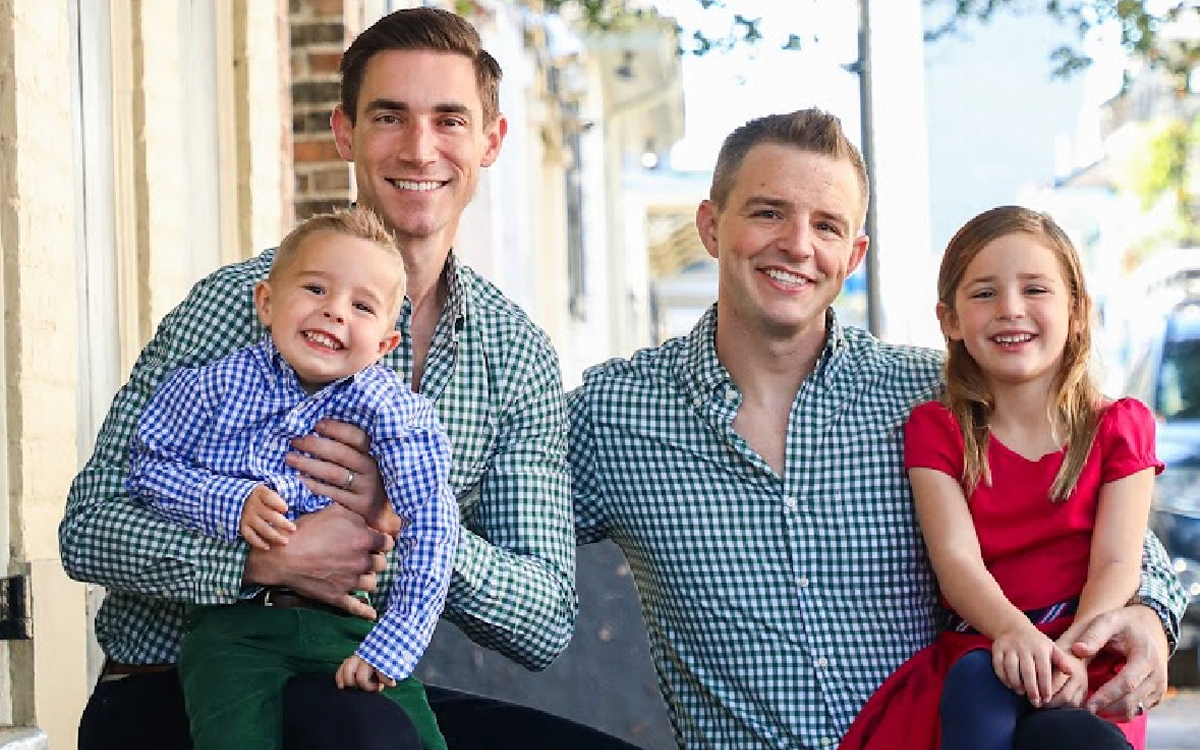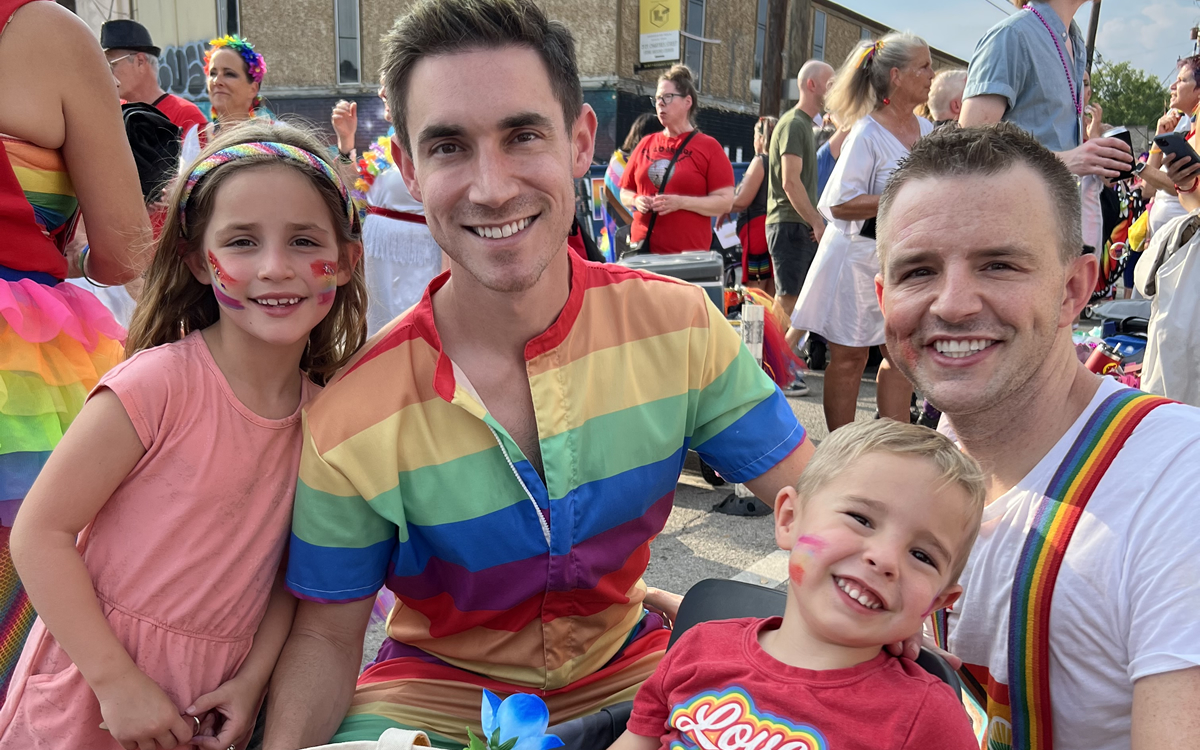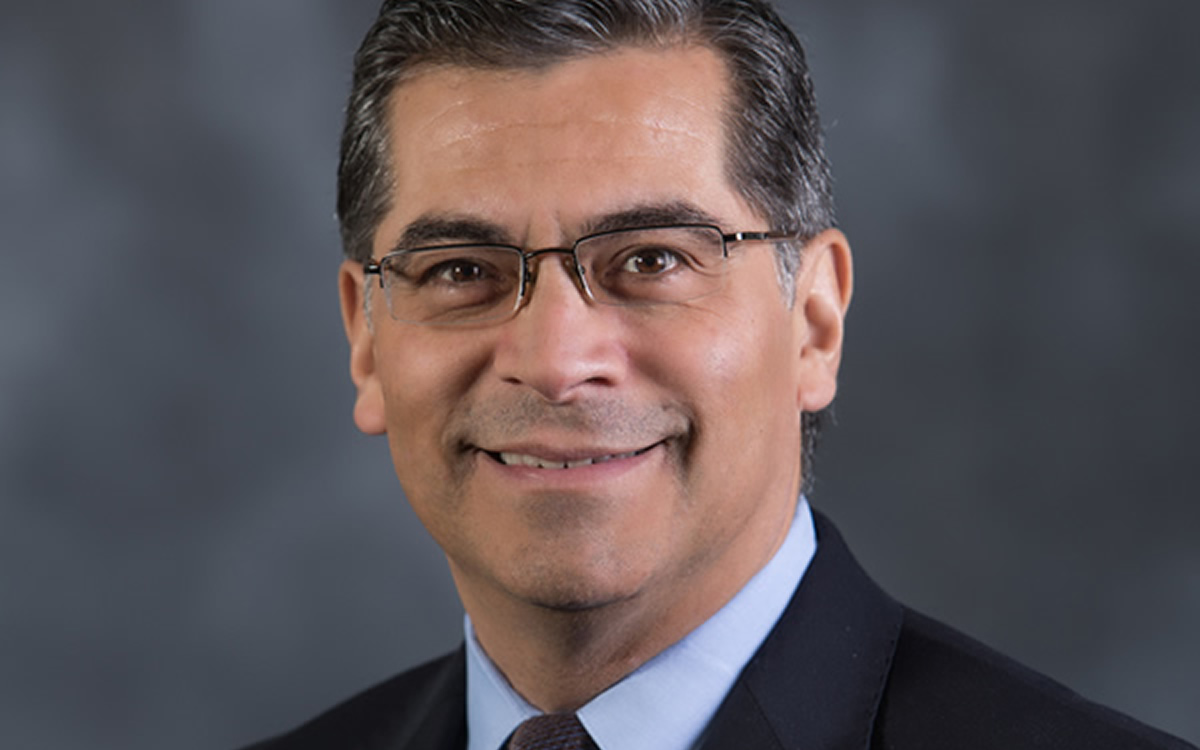National
Acclaimed gay doctor to be honored at LGBT History Month event
Pediatric cardiologist moved from Louisiana to N.Y. in protest over anti-LGBTQ bills

Dr. Jake Kleinmahon, a gay pediatric cardiologist and pediatric heart transplant specialist, is scheduled to be honored Oct. 1 by the Equality Forum at its annual LGBT History Month Kickoff and Awards Celebration in Philadelphia.
He has been named a recipient of the Equality Forum’s 28th annual International Role Model Award.
Kleinmahon became the subject of national news media coverage in early August when he announced he was leaving the state of Louisiana with his husband and two children and ending his highly acclaimed medical practice in New Orleans after the state legislature passed bills targeting the LGBTQ community.
He had been working since 2018 as the medical director of pediatric heart transplant, heart failure, and ventricular assist device programs at Ochsner Hospital for Children in New Orleans.
Kleinmahon told the Washington Blade his and his family’s decision to leave New Orleans was a difficult one to make. He said it came after the Republican-controlled Louisiana Legislature passed three anti-LGBTQ bills, including a so-called “Don’t Say Gay” bill targeting public schools and a bill banning transition-related medical care for transgender youth.
The state’s Democratic governor, John Bel Edwards, vetoed all three bills. But the legislature overturned his veto of the bill banning transition-related medical care for trans minors beginning Jan. 1, 2024.
Kleinmahon said he and his family moved at the end of August to Long Island, N.Y., after he accepted a new job as director of pediatric heart transplant, heart failure and ventricular assist devices at Cohen Children’s Medical Center in the town of New Hyde Park, which is located along the border of the Borough of Queens in New York City and Nassau County, Long Island.
“The decision to leave is not one that we took lightly at all,” Kleinmahon told the Blade. “And it was not one because I got a better job or other factors,” he said. “The main driver for it was that as we realized where things were going, we were raising our children in a state that was actively trying to make laws against your family,” he said in a phone interview. “And that’s not the type of environment that we want to raise our kids in.”
Kleinmahon said he and his husband Thomas timed their move to Long Island at the end of August so their daughter, who’s seven, could begin school at the start of the school year and their son, who’s four, could begin pre-kindergarten sessions.
“We have been open with our children about why we’re moving because we think it’s important that they carry on this message as well,” said Kleinmahon, who noted that his daughter expressed support for the move.
“We were at the dinner table one night and we were explaining what happened,” Kleinmahon said. “And she goes, you know daddy, we do have a choice, but there is only one good one. And she agreed with our moving to New York.”
Kleinmahon acknowledges that some in New Orleans, which is considered an LGBTQ supportive city in general, questioned his decision to leave on grounds that the two bills that would directly impact him and his family did not become law because the governor’s veto of the two bills were upheld.
“One of the things I’ve heard is that none of these really directly affect a family because the ‘Don’t Say Gay’ bill didn’t go into effect, and my children are not transgender, and I don’t work in a transgender clinic,” he told the Blade.
“But that’s really not the point,” he continued. “The way we think about it as a family, the people who are elected officials that are supposed to take care of the people in their state are casting votes against our families,” he points out. “So, sure, while the laws may not be in effect this year, certainly there’s a push to get them passed. And why would we want to remain in a state that is trying to push forward hateful laws?”
He said he will begin his new job at Cohen Children’s Medical Center on Long Island on Nov. 1.
“They have been incredibly supportive,” Kleinmahon said. “They have actually encouraged me to be open with why we left Louisiana,” he said. “And they have a Pride resource group that’s reached out to me to lend their support,” he said, adding that the hospital and its parent company have been “exceptional in helping us make this transition.”
During his medical practice at Ochsner Hospital for Children in New Orleans, Kleinmahon has been credited with helping to save the lives of many children suffering from heart-related ailments. He said his decision to leave behind his colleagues and patients was difficult.
“Unfortunately, it had ramifications for the kids in Louisiana, which was the hardest part for me,” he said. “And the reason for that is I was one of three pediatric heart transplant cardiologists, and I was the director of the only pediatric heart transplant program in Louisiana.”
He added, “While there are two other fantastic heart transplant cardiologists in Louisiana, the ability to keep a program running that serves an entire state needs a full army of people. And me leaving took 33 percent of that army away.”
He said he was also one of just two pediatric pulmonary hypertension providers in the state, and he just learned that the other provider had also left Louisiana recently. Pulmonary hypertension doctors provide treatment for people with the condition of high blood pressure in their lungs.
Regarding his extensive experience in treating and caring for children with heart disease, Kleinmahon, in response to a question from the Blade, said about 400 children receive heart transplants in the U.S. each year.
While heart transplants for kids are not as frequent as those for adults, he said kids needing a heart transplant and their families “deal with a tremendous amount of stress and medical appointments that really change their life,” including the need to take medication to prevent the body from rejecting a new heart for the rest of the children’s lives.
“My hope as a transplant doctor is that I can get these kids to live as normal a life as possible,” he said.
In addition to presenting its International Role Model Award to Kleinmahon, the Equality Forum was scheduled on Oct. 1 at its LGBT History Month event to present its Frank Kameny Award to Rue Landau, the first LGBTQ Philadelphia City Councilperson. It was also scheduled to present a Special Memorial Tribute to the late Lilli Vincenz, the longtime D.C.-area lesbian activist and filmmaker credited with being a pioneering LGBTQ rights activist beginning in the early 1960s.
“I am beyond humble to receive this award that is really not an award for me but is an award for my family and for families like ours and for people that are going to continue to fight discriminatory policies,” Kleinmahon said.
Blade editor Kevin Naff will present Kleinmahon with the award on Oct. 1 in Philadelphia.
“Dr. Kleinmahon and his family took a brave stand in solidarity with the LGBTQ community and they deserve our gratitude,” Naff said. “I’m excited and honored to present him with the International Role Model Award.”

Federal Government
HHS reverses Trump-era anti-LGBTQ rule
Section 1557 of the Affordable Care Act now protects LGBTQ people

The U.S. Department of Health and Human Services Office for Civil Rights has issued a final rule on Friday under Section 1557 of the Affordable Care Act advancing protections against discrimination in health care prohibiting discrimination on the basis of race, color, national origin, age, disability, or sex (including pregnancy, sexual orientation, gender identity, and sex characteristics), in covered health programs or activities.
The updated rule does not force medical professionals to provide certain types of health care, but rather ensures nondiscrimination protections so that providers cannot turn away patients based on individual characteristics such as being lesbian, gay, bisexual, transgender, queer, intersex, or pregnant.
“This rule ensures that people nationwide can access health care free from discrimination,” said HHS Secretary Xavier Becerra. “Standing with communities in need is critical, particularly given increased attacks on women, trans youth, and health care providers. Health care should be a right not dependent on looks, location, love, language, or the type of care someone needs.”
The new rule restores and clarifies important regulatory protections for LGBTQ people and other vulnerable populations under Section 1557, also known as the health care nondiscrimination law, that were previously rescinded by the Trump administration.
“Healthcare is a fundamental human right. The rule released today restores critical regulatory nondiscrimination protections for those who need them most and ensures a legally proper reading of the Affordable Care Act’s healthcare nondiscrimination law,” said Omar Gonzalez-Pagan, counsel and health care strategist for Lambda Legal.
“The Biden administration today reversed the harmful, discriminatory, and unlawful effort by the previous administration to eliminate critical regulatory protections for LGBTQ+ people and other vulnerable populations, such as people with limited English proficiency, by carving them out from the rule and limiting the scope of entities to which the rule applied,” Gonzalez-Pagan added. “The rule released today has reinstated many of these important protections, as well as clarifying the broad, intended scope of the rule to cover all health programs and activities and health insurers receiving federal funds. While we evaluate the new rule in detail, it is important to highlight that this rule will help members of the LGBTQ+ community — especially transgender people, non-English speakers, immigrants, people of color, and people living with disabilities — to access the care they need and deserve, saving lives and making sure healthcare professionals serve patients with essential care no matter who they are.”
In addition to rescinding critical regulatory protections for LGBTQ people, the Trump administration’s rule also limited the remedies available to people who face health disparities, limited access to health care for people with Limited English Proficiency, and dramatically reduced the number of healthcare entities and health plans subject to the rule.
Lambda Legal, along with a broad coalition of LGBTQ advocacy groups, filed a lawsuit challenging the Trump administration rule, Whitman-Walker Clinic v. HHS, and secured a preliminary injunction preventing key aspects of the Trump rule from taking effect.
These included the elimination of regulatory protections for LGBTQ people and the unlawful expansion of religious exemptions, which the new rule corrects. The preliminary injunction in Whitman-Walker Clinic v. HHS remains in place. Any next steps in the case will be determined at a later time, after a fulsome review of the new rule.
GLAAD President Sarah Kate Ellis released the following statement in response to the news:
“The Biden administration’s updates to rules regarding Section 1557 of the ACA will ensure that no one who is LGBTQI or pregnant can face discrimination in accessing essential health care. This reversal of Trump-era discriminatory rules that sought to single out Americans based on who they are and make it difficult or impossible for them to access necessary medical care will have a direct, positive impact on the day to day lives of millions of people. Today’s move marks the 334th action from the Biden-Harris White House in support of LGBTQ people. Health care is a human right that should be accessible to all Americans equally without unfair and discriminatory restrictions. LGBTQ Americans are grateful for this step forward to combat discrimination in health care so no one is barred from lifesaving treatment.”
The White House
Four states to ignore new Title IX rules protecting transgender students
Biden administration last Friday released final regulations

BY ERIN REED | Last Friday, the Biden administration released its final Title IX rules, which include protections for LGBTQ students by clarifying that Title IX forbids discrimination based on sexual orientation and gender identity.
The rule change could have a significant impact as it would supersede bathroom bans and other discriminatory policies that have become increasingly common in Republican states within the U.S.
As of Thursday morning, however, officials in at least four states — Oklahoma, Louisiana, Florida, and South Carolina — have directed schools to ignore the regulations, potentially setting up a federal showdown that may ultimately end up in a protracted court battle in the lead-up to the 2024 elections.
Louisiana State Superintendent of Education Cade Brumley was the first to respond, decrying the fact that the new Title IX regulations could block teachers and other students from exercising what has been dubbed by some a “right to bully” transgender students by using their old names and pronouns intentionally.
Asserting that Title IX law does not protect trans and queer students, Brumley states that schools “should not alter policies or procedures at this time.” Critically, several courts have ruled that trans and queer students are protected by Title IX, including the 4th U.S. Circuit Court of Appeals in a recent case in West Virginia.
In South Carolina, Schools Supt. Ellen Weaver wrote in a letter that providing protections for trans and LGBTQ students under Title IX “would rescind 50 years of progress and equality of opportunity by putting girls and women at a disadvantage in the educational arena,” apparently leaving trans kids out of her definition of those who deserve progress and equality of opportunity.
She then directed schools to ignore the new directive while waiting for court challenges. While South Carolina does not have a bathroom ban or statewide “Don’t Say Gay or Trans” law, such bills continue to be proposed in the state.
Responding to the South Carolina letter, Chase Glenn of Alliance For Full Acceptance stated, “While Supt. Weaver may not personally support the rights of LGBTQ+ students, she has the responsibility as the top school leader in our state to ensure that all students have equal rights and protections, and a safe place to learn and be themselves. The flagrant disregard shown for the Title IX rule tells me that our superintendent unfortunately does not have the best interests of all students in mind.”
Florida Education Commissioner Manny Diaz also joined in instructing schools not to implement Title IX regulations. In a letter issued to area schools, Diaz stated that the new Title IX regulations were tantamount to “gaslighting the country into believing that biological sex no longer has any meaning.”
Governor Ron DeSantis approved of the letter and stated that Florida “will not comply.” Florida has notably been the site of some of the most viciously anti-queer and anti-trans legislation in recent history, including a “Don’t Say Gay or Trans” law that was used to force a trans female teacher to go by “Mr.”
State Education Supt. Ryan Walters of Oklahoma was the latest to echo similar sentiments. Walters has recently appointed the right-wing media figure Chaya Raichik of Libs of TikTok to an advisory role “to improve school safety,” and notably, Raichik has posed proudly with papers accusing her of instigating bomb threats with her incendiary posts about LGBTQ people in classrooms.
The Title IX policies have been universally applauded by large LGBTQ rights organizations in the U.S. Lambda Legal, a key figure in fighting anti-LGBTQ legislation nationwide, said that the regulations “clearly cover LGBTQ+ students, as well as survivors and pregnant and parenting students across race and gender identity.” The Human Rights Campaign also praised the rule, stating, “rule will be life-changing for so many LGBTQ+ youth and help ensure LGBTQ+ students can receive the same educational experience as their peers: Going to dances, safely using the restroom, and writing stories that tell the truth about their own lives.”
The rule is slated to go into effect Aug. 1, pending any legal challenges.
****************************************************************************

Erin Reed is a transgender woman (she/her pronouns) and researcher who tracks anti-LGBTQ+ legislation around the world and helps people become better advocates for their queer family, friends, colleagues, and community. Reed also is a social media consultant and public speaker.
******************************************************************************************
The preceding article was first published at Erin In The Morning and is republished with permission.
Pennsylvania
Malcolm Kenyatta could become the first LGBTQ statewide elected official in Pa.
State lawmaker a prominent Biden-Harris 2024 reelection campaign surrogate

Following his win in the Democratic primary contest on Wednesday, Pennsylvania state Rep. Malcolm Kenyatta, who is running for auditor general, is positioned to potentially become the first openly LGBTQ elected official serving the commonwealth.
In a statement celebrating his victory, LGBTQ+ Victory Fund President Annise Parker said, “Pennsylvanians trust Malcolm Kenyatta to be their watchdog as auditor general because that’s exactly what he’s been as a legislator.”
“LGBTQ+ Victory Fund is all in for Malcolm, because we know he has the experience to win this race and carry on his fight for students, seniors and workers as Pennsylvania’s auditor general,” she said.
Parker added, “LGBTQ+ Americans are severely underrepresented in public office and the numbers are even worse for Black LGBTQ+ representation. I look forward to doing everything I can to mobilize LGBTQ+ Pennsylvanians and our allies to get out and vote for Malcolm this November so we can make history.”
In April 2023, Kenyatta was appointed by the White House to serve as director of the Presidential Advisory Commission on Advancing Educational Equity, Excellence and Economic Opportunity for Black Americans.
He has been an active surrogate in the Biden-Harris 2024 reelection campaign.
-

 District of Columbia4 days ago
District of Columbia4 days agoCatching up with the asexuals and aromantics of D.C.
-

 South America4 days ago
South America4 days agoArgentina government dismisses transgender public sector employees
-

 Maine5 days ago
Maine5 days agoMaine governor signs transgender, abortion sanctuary bill into law
-

 Mexico3 days ago
Mexico3 days agoMexican Senate approves bill to ban conversion therapy












